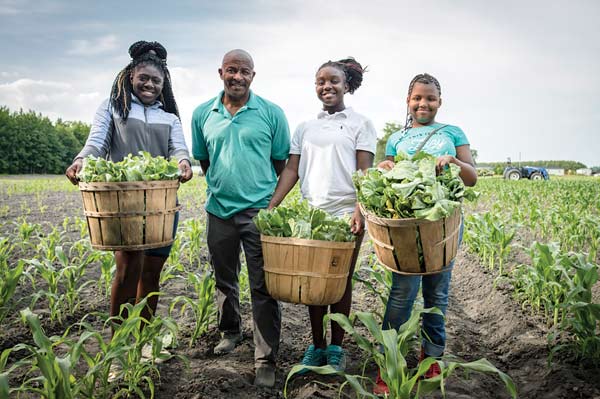Subtotal: $
Checkout-

The Boy and the Bull
-

This Is My Body
-

The Greatest Thing Since Sliced Bread
-

The Ground of Hospitality
-

Beating the Big Dry
-

Cows and Elephants
-

At the Welcome Table I
-

At the Welcome Table II
-

Love Is Work
-

How Shall We Farm?
-

Why Yemen Starves
-

Digging Deeper: Issue 20
-

Cloth and Cup
-

Level
-

Editors’ Picks Issue 20
-

The Necessity of Reverence
-

A Book to End All Walls
-

Edna Lewis
-

The Dead Breed Beauty
-

Table Fellowship
-

Covering the Cover: The Welcome Table
-

Restoring a Creek
-

What I Stand For Is What I Stand On
-

Feasting in Kurdistan
-

The Birthday Party at the End of the World
-

From Farm to Feast
-

Readers Respond: Issue 20
-

Family and Friends: Issue 20

Streams in the Desert
Letter from North Carolina
By Richard Joyner
May 24, 2019
Available languages: français
Next Article:
Explore Other Articles:
Gardens teach freedom. Here in Conetoe, North Carolina, our community is surrounded by a food desert on all sides. A quarter of households in our county live below the federal poverty level. Poor nutrition has caused more young deaths here than car accidents. I’ve been a hospital chaplain for years, accompanying one family after another as they stand at the graveside of someone who died too young. I remember the day on the way home from the hospital that I pulled my car over and prayed. It was like I heard God saying, “Open your eyes and look around.” There were fields flowing out in every direction.

Richard Joyner at Conetoe Family Life Center with coworkers. Photograph courtesy of the author
But there’s been a hard past in those fields. My parents and grandparents were sharecroppers. The generation before them were slaves. Those fields didn’t spell freedom for me. But now a new vision began to overwrite the past. What if our community could turn this around, find our freedom in good soil, and start to believe in a future where families can survive and thrive through determination, creativity, and last year’s seeds?
Conetoe Family Life Center has been running for fourteen years now. Young people in our program build social and spiritual skills as they discover what it’s like to be one with the land. Yes, we learn how to grow everything that can grow in this soil. But we’re also learning how to invest in the community, putting food on family tables as well as selling vegetables, fruit, and honey to local restaurants, hospitals, and school systems. Then we reinvest those proceeds in the ground.
I want the children to know, “I can do this! I can contribute to my family’s and community’s well-being.” We’ve gone from being a dangerous food desert to being a community that can feed hundreds of families each week without relying on outside sources. Our financial income levels have not changed. But what we do with our shared strength means that our net income has changed. We’re not dependent – we can speak and work justice. If a child knows that because of work and community, the lights aren’t going out, the food will be on the table, the roof will stay over his head, that’s justice. The early mortality rate is dropping steeply, and that’s justice.
When our community gathers for a festival, we’re celebrating our own roots. We acknowledge pain and injustice; we know there is much that still needs to change. But we also give thanks for the chance to grow God-given food, and to eat it in peace together. Here in Conetoe, gathering around a table is a life-saving action.
Already a subscriber? Sign in
Try 3 months of unlimited access. Start your FREE TRIAL today. Cancel anytime.






































